Discover The Heart of Healthcare | A Digital Health Podcast
The Heart of Healthcare | A Digital Health Podcast

The Heart of Healthcare | A Digital Health Podcast
Author: Massively Better Healthcare
Subscribed: 11,667Played: 68,917Subscribe
Share
© 2026 Massively Better Healthcare
Description
🏆 #1 podcast in the Top 100 Health Tech All-time charts
Join us every Monday for conversations with the biggest names in digital health. Hosted by digital health veterans Halle Tecco, Michael Esquivel, and Steve Kraus.
Learn more and submit your ideas for the show at the Heart of Healthcare website.
210 Episodes
Reverse
In this episode (recorded live), Halle Tecco speaks with Dr. Robert Wachter, Chair of Medicine at UCSF, about their concurrently released books on healthcare innovation and AI.They share thoughts on the dual challenge of innovation in healthcare and the role of AI, covering:Why past waves of tech failed to change healthcare and why AI may finally break throughHow AI is making a difference today in healthcareWhere AI-assisted diagnosis and prescribing could go next, and the risks of over-relying on humans “in the loop” How EHR vendors (like Epic) hold the "poll position" for AI implementation due to workflow integrationWhy innovators must become healthcare "anthropologists"; and clinicians must understand technology and AIPlus, a surprise guest from Prenuvo joins us to chime in. Order Halle’s new book, Massively Better Healthcare hereOrder Bob’s new book, A Giant Leap here—About our guest: Robert M. Wachter, MD is Professor and Chair of the Department of Medicine at the University of California, San Francisco (UCSF). Author of 300 articles and 6 books, he coined the term “hospitalist” in 1996 and is often considered the “father” of the hospitalist field, the fastest-growing medical specialty in U.S. history. He is a past president of the Society of Hospital Medicine, past chair of the American Board of Internal Medicine, a Master of the American College of Physicians, and an elected member of the National Academy of Medicine. Modern Healthcare magazine has ranked him among the 50 most influential physician-executives in the U.S. more than a dozen times; he was #1 on the list in 2015. His 2015 book, The Digital Doctor: Hope, Hype and Harm at the Dawn of Medicine’s Computer Age, was a New York Times bestseller. His new book is A Giant Leap: How AI is Transforming Healthcare and What That Means for Our Future.See Privacy Policy at https://art19.com/privacy and California Privacy Notice at https://art19.com/privacy#do-not-sell-my-info.
Physicians now face a world where search bars, chat apps, and large AI models are becoming many people’s first stop for health questions, long before they enter a clinic.Former Google Chief Health Officer and national health IT leader Dr. Karen DeSalvo joins us to unpack what this shift means for clinicians, regulators, and patients, and why 15% of daily Google searches are questions no one has ever asked before.We cover:• Why consumer health search is becoming a powerful entry point into care• How Google built guardrails for safety, quality, and real-time monitoring of emerging risks• What the rise of GenAI “doctor in your pocket” tools could mean• The regulatory tensions ahead as states experiment with AI-driven medical decision support• How global demand, workforce strain, and new data sources (IoT, at-home diagnostics, wearables) are accelerating AI-supported primary care—About our guest: Dr. Karen DeSalvo is a health leader who has committed her career to improving health for everyone, everywhere. She was most recently Google’s Chief Health Officer, where spearheaded a global team of health professionals dedicated to harnessing Google's technology and platforms to help everyone, everywhere live a longer, healthier life. Before Google, Dr. DeSalvo held significant roles in the U.S. government, including National Coordinator for Health Information Technology and acting Assistant Secretary for Health. She was also the Health Commissioner in New Orleans following Hurricane Katrina, where she led public health recovery efforts. Dr. DeSalvo currently sits on the Boards of Directors for Welltower and CityBlock Health and is a member of the Council of the National Academy of Medicine. —Pre-order Halle's new book, Massively Better Healthcare.—📍 Connect with us:Heart of Healthcare websiteLinkedInInstagramYoutube See Privacy Policy at https://art19.com/privacy and California Privacy Notice at https://art19.com/privacy#do-not-sell-my-info.
We’re back with our monthly rundown of the top headlines in health tech!Today, Halle and Steve sort through the biggest stories shaping the year ahead, from AI prescribing to lawsuits galore.We cover:AI prescribing (in Utah!)The FDA updated guidance on clinical decision support for AI in medicineThe lawsuit against Prenuvo after a missed stroke warning, and the broader debate over accountability in AI-assisted diagnosticsTexas’ antitrust case against Epic - are they being anti-competitive?New evidence shows GLP-1 drugs lower employer healthcare costs by 9%Why healthcare hiring is slowing downHalle’s book is now available! (Order now on Amazon)Show notes:Utah begins pilot of prescribing AI medication (Utah Department of Commerce)FDA issues guidance on wellness products, clinical decision support software (AHA)Man got $2,500 whole-body MRI that found no problems—then had massive stroke (Ars Technica)Texas sues Epic, accusing it of running a monopoly (Wisconsin Public Radio)Why cover GLP-1s? They’ll lower employer healthcare costs, study says (Healthcare Dive)Hospitals' make-or-break year (Axios)—🙏 Thank you to our show sponsor, Smarter Technologies, the first automation and insights platform for healthcare efficiency. Learn more at www.smartertech.com—📍 Connect with us:Heart of Healthcare websiteLinkedInInstagramYoutubeSee Privacy Policy at https://art19.com/privacy and California Privacy Notice at https://art19.com/privacy#do-not-sell-my-info.
It has been said that we don’t have “big data” in healthcare, but instead a large amount of “small data.”In this episode, Halle speaks with Kyle Armbrester, CEO of Datavant and former CEO of Signify Health (acquired for $8B), about why healthcare data still moves the way it did decades ago and what it will take to modernize it at scale. Kyle reflects on building and leading large health tech companies and explains how fixing data flow could reduce administrative waste, improve security, and make care easier for patients and providers alike.We cover:Why healthcare billing still happens after the fact and how that fuels administrative wasteHow missing data standards led to fax-based workflows and brittle systemsWhy healthcare data is such an attractive target for cyberattacksHow clinical data can be shared digitally without being owned or resoldLeadership lessons from scaling companies through IPOs and acquisitions—About our guest: Kyle Armbrester is Chief Executive Officer of Datavant, a healthcare data platform company with a mission to make the world’s health data secure, accessible, and actionable. Datavant operates the largest and most diverse health data exchange in the U.S., connecting more than 70 percent of the 100 largest health systems, all U.S. payers, and 300 plus real world data partners.Previously, Kyle served as CEO of Signify Health, where he led more than 200 percent revenue growth, took the company public in 2021, and guided its acquisition by CVS Health in 2023 for approximately $8 billion. He later served on the CVS Health executive management team, overseeing healthcare delivery strategy and interoperability.Earlier in his career, Kyle was Chief Product Officer and Head of Corporate Development at athenahealth, where he helped scale revenue from $320 million to $1.2 billion and launched the company’s partnership marketplace. Kyle has served on multiple healthcare boards and holds an MBA and AB from Harvard University.—Chapters:00:01:20 Introduction to Kyle Armbrester and his journey in healthcare00:03:58 The impact of Athena Health on healthcare innovation00:06:20 Datavant: Revolutionizing health data interoperability00:08:15 The role of Datavant in reducing administrative burden00:12:20 Understanding Datavant's value proposition across stakeholders00:14:00 Consumer products and data accessibility at Datavant00:18:25 The scale and impact of Datavant in healthcare00:19:35 Cybersecurity challenges in healthcare data management00:23:57 Bridging the gap in healthcare regulations00:26:13 Unlocking the value of untapped healthcare data00:29:25 Challenges of value-based care models00:33:23 The reality of being a CEO in healthcare00:37:00 Navigating IPOs vs. Acquisitions00:39:44 Innovating healthcare incentives for better outcomes—Pre-order Halle's new book, Massively Better Healthcare.—📍 Connect with us:Heart of Healthcare websiteLinkedInInstagramYoutube See Privacy Policy at https://art19.com/privacy and California Privacy Notice at https://art19.com/privacy#do-not-sell-my-info.
This week, Steve sits down with Ankit Jain, co-founder and CEO of Infinitus Systems, to talk about why voice-based AI has become one of the most rapidly adopted tools in healthcare operations, what’s actually working in the field, and where the hype still outpaces reality. Ankit shares six years of lessons from building AI agents that handle 35-minute medical calls end to end, plus his predictions on what 2026 and 2027 will really look like as enterprises attempt to build their own agents.We cover:Why so much of healthcare still runs on phones, faxes, and portalsHow AI agents are handling long, high-stakes medical calls without going off trackWhat large enterprises now expect around security, governance, and zero-hallucination requirementsWhy providers, payers, and pharma are adopting AI for different operational workflowsWhy 2026 may be the year many health systems try to build their own agents, and why most will return to vendors by 2027—About our guest: Ankit Jain is the co-founder and CEO of Infinitus Systems, the agentic healthcare communications platform that automates high-stakes clinical and administrative conversations at scale. Under his leadership, Infinitus supports 44% of the Fortune 50, and many of the largest healthcare organizations in the US. A serial entrepreneur, advisor, and investor, Ankit has built companies and guided innovation at the intersection of technology and AI. He founded Quettra (acquired by Similarweb), helped launch Google Play and the search engine Cuil, and went on to co-found and manage Gradient Ventures, Google’s AI-focused venture fund. His background in building distributed systems and safety-constrained AI, combined with hands-on experience scaling products in regulated environments, gives him a pragmatic perspective on how to design trustworthy AI that earns adoption in healthcare. Ankit frequently works with industry leaders on governance, education, and integration strategies that make automation safe, approachable, and scalable.—Chapters:00:01:38 Introduction to Ankit Jain and Infinitus Systems00:02:54 The journey into healthcare entrepreneurship00:03:55 Inspiration behind Infinitus and its mission00:04:55 Evolution of AI in healthcare communications00:08:12 Navigating competition in the AI healthcare space00:10:30 Defensibility and product development insights00:14:00 AI's role in enhancing healthcare accessibility00:15:20 Go-to-Market strategies and lessons learned00:17:52 Deepening engagement in healthcare workflows00:19:33 Competitive dynamics in healthcare AI00:20:42 Addressing industry concerns and challenges00:22:14 The need for industry self-regulation00:23:40 Navigating consumer privacy and AI interactions00:25:27 The future of jobs in healthcare AI00:28:30 The evolution of healthcare AI00:29:37 Lessons for entrepreneurs in healthcare—Pre-order Halle's new book, Massively Better Healthcare.—📍 Connect with us:Heart of Healthcare websiteLinkedInInstagramYoutube See Privacy Policy at https://art19.com/privacy and California Privacy Notice at https://art19.com/privacy#do-not-sell-my-info.
Is 2026 the year that changes everything in healthcare?Steve and Halle sit down with legendary healthcare VC Annie Lamont for their annual predictions episode to dive into 2026 predictions and trends that founders and operators should pay attention to. We cover:📉 Why 2025 was "the most brutal year ever" for health plans🏥 Why providers outpaced payers in AI adoption and where the next wave of enterprise software will land💸 Where she’s spending her time in 2026 (and what space she’s avoiding)🔮 What she expects for IPOs and M&A in 2026⚖️ How regulation, interoperability, and national AI policy could shape the next decade—About our guest: Annie Lamont co-founded Oak HC/FT in 2014. Prior to founding Oak HC/FT, Annie spent 28 years at Oak Investment Partners, where she served as a Managing Partner and led the healthcare and fintech practices. Over the course of her career, she has invested in category-defining companies across the healthcare and financial services industries, including Aspire Health, athenahealth, CareBridge, Devoted Health, iHealthTechnologies (which became Cotiviti), NetSpend, OneMedical, and VillageMD. —📍 Connect with us:Heart of Healthcare websiteLinkedInInstagramYoutubeSee Privacy Policy at https://art19.com/privacy and California Privacy Notice at https://art19.com/privacy#do-not-sell-my-info.
For our first episode of 2026, Dr. Ezekiel “Zeke” Emanuel, oncologist, bioethicist, architect of the Affordable Care Act, and author of Eat Your Ice Cream joins us to share why he believes the longevity movement is overblown and how real health comes down to simplicity. In his new book, Zeke argues that instead of chasing expensive fads and wellness trends, we should focus on six straightforward habits that make life healthier and more enjoyable. In this conversation with co-host Steve Kraus, he explains why complexity is one of healthcare’s biggest threats, how public frustration is reshaping policy, and why the path to better health may be far simpler than we think.We cover:🚫 Rejecting the wellness industrial complex📈 Why public frustration will force major policy changes by 2032🧩 How the ACA's success created a huge new flaw🤖 The two biggest bottlenecks that slow down hospital AI implementation💡 How to improve quality and empathy with specialized medical AY systems—About our guest: Ezekiel J. Emanuel, MD, PhD, is a Vice Provost and Professor at the University of Pennsylvania. An oncologist and world leader in health policy and bioethics, he was instrumental in drafting the Affordable Care Act (ACA). Dr. Emanuel regularly contributes to the New York Times, the Washington Post, the Wall Street Journal, The Atlantic, and appears on BBC, NPR, CNN, MSNBC, CNBC and other media outlets. His new book, Eat Your Ice Cream: Six Simple Rules for a Long and Healthy Life, is available on January 6. —📍 Connect with us:Heart of Healthcare websiteLinkedInInstagramYoutube —Chapters:00:00:50 Introducing Dr. Ezekiel Emanuel00:06:04 His path to medicine00:09:15 Working on Obamacare - successes and regrets00:11:19 Is healthcare too big to fail?00:14:18 The antidote to the “longevity” movement00:17:18 How to stay mentally sharp00:18:34 AI and job displacement00:22:57 Critique of the “Wellness Industrial Complex”00:25:10 Philosophy on life expectancy and quality00:27:16 Optimism about AI in healthcare00:30:20 Lightning round of questionsSee Privacy Policy at https://art19.com/privacy and California Privacy Notice at https://art19.com/privacy#do-not-sell-my-info.
We’re closing out the year with a candid conversation about where America is headed.For our final episode of 2025, Halle and Steve sit down with entrepreneur and former presidential candidate Andrew Yang to talk plainly about the forces reshaping American life, from rising healthcare costs and gaps in coverage to AI-driven job disruption and the strain on the social safety net. We cover:🏛️ Andew’s idea of “Medicare for all who want it”🤖 How AI is already wiping out entry-level jobs, and why he thinks America is heading toward a “bad men problem”💸 Why he ran on Universal Basic Income which he calls “capitalism where income doesn’t start at zero”🏥 How entrenched players restrict physician supply, shape regulation, and protect revenue even when it hurts patients📵 His new effort to cut phone addiction and why he says parents, schools, and policymakers are waking up to the damage caused by screen-first childhoods—About our guest: Andrew Yang is an entrepreneur, author, philanthropist, attorney, nonprofit leader, and former U.S. presidential and New York City mayoral candidate. After a brief stint as a corporate lawyer, he worked in startups and founded an education company that became #1 in the country. He later launched Venture for America, a national nonprofit that empowered thousands of young entrepreneurs to build careers in cities such as Detroit, Cleveland, and Baltimore. Under his leadership, the organization became a multi-million-dollar charity, and Yang was named a Presidential Ambassador of Entrepreneurship and a Champion of Change during the Obama administration.Motivated by the impact of automation on the American workforce, Yang ran for President in 2017. Centered on a proposed $1,000-per-month “Freedom Dividend,” his campaign raised nearly $40 million and helped mainstream conversations around Universal Basic Income. He later founded Humanity Forward, a nonprofit that has successfully advocated for billions of dollars in federal cash relief.Yang is also an author, CNN commentator, and podcast host. He is the son of Taiwanese immigrants, and holds degrees from Brown University and Columbia Law School.—Chapters:00:2:22 Andrew’s Vision for American Healthcare00:7:27 Healthcare and the 2026 Election00:9:59 AI’s Impact on Employment and Society00:22:35 Universal Basic Income 00:29:14 Regulatory Capture in Healthcare00:31:37 Noble Mobile00:33:57 Children and Phone Addictions00:43:19 Closing Advice for Healthcare Innovators—Pre-order Halle's new book, Massively Better Healthcare. —📍 Connect with us:Heart of Healthcare websiteLinkedInInstagramYoutube See Privacy Policy at https://art19.com/privacy and California Privacy Notice at https://art19.com/privacy#do-not-sell-my-info.
Many clinicians quietly wonder if there's a “next chapter” beyond the hospital walls, and an increasing number are stepping into health tech roles that didn’t exist a decade ago.Dr. Reena Pande has lived that shift firsthand: from cardiologist at a top academic center, to early employee and CMO at AbleTo, to now leading clinician executive search at Oxeon. She joins us to unpack what it really takes for clinicians to succeed in startups, why these roles matter more than ever, and how AI is reshaping both medical training and leadership.We cover:🩺 What true self-assessment looks like🚀 What clinicians often misunderstand about joining a Series A startup🐈 The “indoor cat vs. outdoor cat” model for modern clinical leadership📉 How to evaluate risk when moving from academic medicine into early-stage companies📊 Why clinician leaders are central to sales, product, and operations in virtual care🤖 How AI is reshaping medical expertise and what future clinicians must be trained for—About our guest: Dr. Reena Pande is a Partner and leads Oxeon’s Clinician Executive search and leadership practice. She is a physician, entrepreneur, and healthcare executive whose career has focused on building innovative solutions to ensure access to evidence-based, and technology-enabled care. For nearly a decade, Dr. Pande served as Chief Medical Officer at AbleTo, a virtual behavioral health provider. During her tenure, she served as a passionate external voice for bridging the gaps between physical and mental health, and also led clinical product, data science, healthcare economics, and outcomes research teams. Dr. Pande saw the organization through numerous fundraising rounds and eventual acquisition by Optum/UnitedHealth Group.Prior to her time at AbleTo, Dr. Pande was an academic cardiologist and clinical researcher at Brigham and Women’s Hospital in Boston, MA and was on the faculty at Harvard Medical School. She earned her undergraduate degree in Biology from Harvard University, her M.D. from Harvard Medical School, and a Masters degree in Epidemiology from the Harvard School of Public Health. She completed her internship, residency training, and Cardiology fellowship at Brigham and Women’s Hospital.—📚Want more? Read The Clinician’s Guide to Breaking Into Digital Health—Women founders, access a lifetime of community-backed growth with Entreprenerustia: https://refer.entreprenista.com/founder —📍 Connect with us:Heart of Healthcare websiteLinkedInInstagramYoutube See Privacy Policy at https://art19.com/privacy and California Privacy Notice at https://art19.com/privacy#do-not-sell-my-info.
Hemant Taneja believes you can sneeze and reach a billion dollars in healthcare revenue, but that most of that revenue tells you nothing about whether the system is actually getting better.This week, Halle sits down with the CEO of General Catalyst and author of The Transformation Principles to discuss what happens when you stop treating revenue as the primary KPI and start asking harder questions about impact, incentives, and system change. They get into his “health assurance” thesis, what it means for a VC firm to buy a hospital, why “profit-only” capitalism has run its course, and how AI and new payment models could finally bend the cost curve instead of just inflating it.We cover:🏥 How Hemant began investing in healthcare and his “health assurance” thesis📉 Why profit‑only capitalism has run its course and what should replace it💳 The “work tax” in healthcare payments and how AI could free up resources for prevention🤖 Whether AI in healthcare is a bubble or a durable transformation🏥 Why General Catalyst bought a hospital and how they plan to use it —About our guest: Hemant Taneja is the CEO of General Catalyst, and a founder, investor, and author of four books, including The Transformation Principles. His worldview centers on strengthening global resilience through applied AI and partnerships that modernize critical systems. Hemant is an early investor in the leading technology companies of our time including Anduril, Anthropic, Applied Intuition, GitLab (NASDAQ: GTLB), Grammarly, Gusto, Ro, Samsara (NYSE: IOT), Snap (NYSE: SNAP), and Stripe. He is also deeply involved in transforming the US healthcare system, having founded companies like Commure, Hippocratic, Transcarent, Livongo (Sold to Teladoc for $18.5B) and General Catalyst's Health Assurance Transformation Company (HATCo) which helps health systems transform themselves with AI. A global expert on industry transformation, he has led General Catalyst's foray into transforming healthcare, energy, and workforce systems globally. He holds five degrees from MIT.—🙏Thank you to our show sponsor, LookDeep. LookDeep pioneers AI that can see, hear, and respond with care to help hospitals be Ever Present for Every Patient. Learn more at lookdeep.ai/aimee. —📍 Connect with us:Heart of Healthcare websiteLinkedInInstagramYoutubeSee Privacy Policy at https://art19.com/privacy and California Privacy Notice at https://art19.com/privacy#do-not-sell-my-info.
The Haves & Have-Nots Of 2025 | Threshold Ventures Co-founder Emily MeltonThis week for our 2025 recap, we’re joined by VC Emily Melton, co-founder of Threshold Ventures. Melton highlights her reflection of 2025, which splits the market into "haves and have-nots" with nothing in between, noting the concentration of venture dollars on "high flyers" and the indifference shown to established companies with respectable revenue.We cover: 💸 The widening gap between the “haves” and “have-nots” in health tech 📉 The rise of recaps, down rounds, and investor “bargain-basement shopping” 🏥 Why healthcare’s 5.6-trillion-dollar cost structure can’t be fixed without technology 🧾 How policy incentives and private equity are reshaping M&A activity 💬 What founders need to prove to raise capital in today’s market —About our guest: Emily is a co-founder of Threshold. She is looking for entrepreneurs who are genuinely excited about being agents of change and have an almost irrational drive to make things better. Her portfolio includes BetterUp, Brightline, Daero, Elation Health, Imagen, Livongo (NASDAQ: LVGO), Mendaera, ODAIA, Redfin (NASDAQ: RDFN), Tia, Transcarent, Verge Genomics, Videa, Vital, Viz, and Wellframe (acquired by HealthEdge). Emily served as the chair of the National Venture Capital Association (NVCA) board of directors for the 2022-23 term. She is also an active founding member of All Raise, a non-profit dedicated to improving access for women and others to start and invest in companies. A Stanford grad with a BA in political philosophy with honors and an MBA, Emily is drawn to disruptive ideas and technologies that have the potential to radically change consumer, enterprise, and healthcare markets.—📍 Connect with us:Heart of Healthcare websiteLinkedInInstagramYoutube See Privacy Policy at https://art19.com/privacy and California Privacy Notice at https://art19.com/privacy#do-not-sell-my-info.
The first trillion-dollar healthcare company, a $298M longevity round, and a telehealth CEO headed for federal sentencing. Last month had range.Today on the show, Halle and Michael sort through the biggest December stories shaping the year ahead, from runaway longevity funding to a telehealth scandal headed for federal sentencing.We cover:🧬 Two hot funding rounds in longevity, including Function Health’s $298M B-round and Blueprint’s all-angel, no-VC $60M raise💊 How Eli Lilly became the first trillion-dollar healthcare company🏥 CVS’s $5.7B Oak Street Health write-down (and why most acquisitions fail)🎓 Nursing, OT, PT, and PA being removed from the list of “professional” degrees by the Department of Education🤖 OpenAI’s growing interest in consumer health tools⚖️ The telehealth company whose founders were just convicted in one of the largest stimulant-fraud cases to date—Show notes:Eli Lilly becomes first trillion-dollar healthcare company (Reuters)CVS takes $5.7B goodwill impairment on Oak Street Health (Forbes)Department of Education’s revised “professional degree” list (Newsweek)NYT: Patients turning to AI for support (Dagens.com)DOJ conviction of Done Global executives (DOJ)—📍 Connect with us:Heart of Healthcare websiteLinkedInInstagramYoutubeSee Privacy Policy at https://art19.com/privacy and California Privacy Notice at https://art19.com/privacy#do-not-sell-my-info.
As millions of Americans hit the road to visit family for Thanksgiving, many will pass through, or return to, rural communities. Nearly 60 million Americans live in these areas, yet many struggle to access even basic healthcare as rural hospitals close at record rates.Dr. Jennifer Schneider, co-founder and CEO of Homeward Health, is tackling this crisis head-on by reimagining how care is delivered to Medicare Advantage members in rural America. Drawing on her experiences as a physician, a patient with Type 1 diabetes, and the former president of Livongo, Jenny shares why rural healthcare is both a massive challenge and an untapped opportunity.We cover:🏥 Why rural Americans face dramatically higher mortality rates💡 How Homeward is combining technology and on-the-ground care to serve overlooked communities📉 What value-based care looks like outside major metro areas🤝 Lessons from Castlight, Livongo, and building bilingual (tech + healthcare) teams🔥 How Jenny’s personal experience with chronic illness shapes her leadership and vision—About our guest: Dr. Jennifer Schneider is the co-founder and CEO of Homeward, where she is leading the transformation of rural healthcare through AI-enabled, value-based care delivery. A physician and technologist, Jennifer’s work is shaped by her experience growing up in a small town with type 1 diabetes—fueling her belief that geography should never determine access to care.Previously, Jennifer was President and Chief Medical Officer at Livongo, where she helped scale the company through its IPO and led its $18.5B merger with Teladoc Health—the largest digital health transaction to date. She has also held executive roles at Castlight Health and began her career as a practicing internal medicine physician and health services researcher.Jennifer serves on the boards of Vertex Pharmaceuticals and Maven Clinic, and has been named one of Modern Healthcare’s “100 Most Influential People in Healthcare.” She holds degrees from Johns Hopkins, Stanford, and the College of the Holy Cross.—📍 Connect with us:Heart of Healthcare websiteLinkedInInstagramYoutubeSee Privacy Policy at https://art19.com/privacy and California Privacy Notice at https://art19.com/privacy#do-not-sell-my-info.
On the heels of raising $210 million at a $6 billion valuation, OpenEvidence is the fastest-growing physician app in history, now reaching over 40% of U.S. physicians and powering 17 million monthly clinical queries.In this conversation, co-founder and CTO Zack Ziegler shares how his background in early large language models led him to build an AI that helps clinicians make better decisions at the point of care, without replacing their judgment.We cover:🧠 The strategies Open Evidence used to reach 40% of U.S. clinicians in a short time💡 The unexpected reason they chose to go direct to doctors instead of via their employers💰 How they make money⚙️ What “Deep Consult” means for the future of clinical decision-making🏥 Whether tools like this could ever—or should ever—be available to patientsAbout our guest: Zachary Ziegler is the cofounder and CTO of OpenEvidence, the leading medical information platform. Designed from the ground up for medical professionals, OpenEvidence organizes and expands the world's medical knowledge to make it more useful, open, accessible, and understandable. Launched out of the Mayo Clinic Platform Accelerate, OpenEvidence has become the most rapidly adopted tool by physicians in history, now used by over 40% of US physicians in over 15,000 care centers across the United States. Before founding OpenEvidence, Ziegler was a PhD student at Harvard University, where he worked with Professor Sasha Rush and was awarded the National Science Foundation Graduate Research Fellowship. He completed his undergraduate studies at Cornell University, where he received the Barry Goldwater Scholarship.—🙏Thank you to our show sponsor, LookDeep. LookDeep pioneers AI that can see, hear, and respond with care to help hospitals be Ever Present for Every Patient. Learn more at lookdeep.ai/aimee.—📍 Connect with us:Heart of Healthcare websiteLinkedInYouTubeInstagramSee Privacy Policy at https://art19.com/privacy and California Privacy Notice at https://art19.com/privacy#do-not-sell-my-info.
A billion-dollar startup. A promise to change healthcare forever. And behind the scenes… a massive lie.Tyler Shultz was just starting his career when he joined Theranos, only to discover that the company’s breakthrough blood tests didn’t actually work. Speaking up meant risking everything—his career, his family relationships, and his personal safety—but it also helped expose one of the biggest frauds in Silicon Valley history.In this conversation, Tyler shares what it was really like inside Theranos, how he found the courage to blow the whistle, and what leaders today can learn about building ethical cultures that last.We cover:⚖️ What it was like working inside Theranos💬 The one question he suggests job seekers ask potential employers💡 What ethical leadership looks like when the pressure is on🤨 His thoughts on Elizabeth Holmes’ new “blood testing” company💰 Why rewarding whistleblowers might actually protect investors and patients —About our guest: Tyler Shultz is a scientist at heart, a founder by nature, a whistleblower by accident, a speaker by day, a venture partner by night, and a dad 24/7. His professional life began by exposing unethical practices at Theranos, a revelation that led to the collapse of the $9 billion company and the criminal convictions of its CEO and COO. Since then, he has co-founded two diagnostics companies: a deep tech spinout from Stanford’s Center for Magnetic Nanotechnology and a direct-to-consumer diagnostics and telehealth company. Beyond building companies, Tyler advises startups and venture funds, helping them navigate the technical, commercial, and ethical challenges of scaling groundbreaking ideas. As a speaker, he shares his experiences with audiences worldwide, addressing lawyers, founders, executives, employees, students, investors, board members, regulators, and compliance experts. He explores themes of truth, courage, and integrity, demonstrating how ethical decision-making can be a competitive advantage.—📍 Connect with us:Heart of Healthcare websiteLinkedInInstagramYoutube See Privacy Policy at https://art19.com/privacy and California Privacy Notice at https://art19.com/privacy#do-not-sell-my-info.
Does it feel like we packed in a decade of progress this year in digital health? We think so. Today, Halle and Steve break down the biggest digital health stories of the moment, from funding trends to AI rivalries and new rules shaping the future of care.We cover:💸 What non-AI healthcare startups should do in today’s AI-obsessed investor market🧠 Is there room for more than one winner in clinical decision support tools?⚖️ California’s new chatbot law🩺 Why UnitedHealthcare just paid $9B to AARP despite Medicare Advantage headwinds🌡️ Hims’ expansion into menopause care and what it means for vertical startups🤖 How Mass General Brigham is using AI to ease doctor shortages—Show notes:The Future of Healthtech 2025 (SVB)2025: The State of AI in Healthcare (Menlo Ventures)Q3 2025 market overview: Signals out of sync (Rock Health)OpenEvidence scores $200M, 3 months after series B, boosting valuation to $6B (Fierce Healthcare)Wolters Kluwer’s new UpToDate Expert AI (Wolters Kluwer)New California ‘Companion Chatbot’ Law Imposes Disclosure, Safety Protocol and Annual Reporting Requirements (Skadden)UnitedHealth Group, AARP Extend Medicare Partnership Beyond 2025 (Forbes)Hims & Hers to Offer Treatments for Menopause (WSJ)One Mass. health system is turning to AI to ease shortage of primary care doctors. Some don’t like it (STAT)—🙏 If you're enjoying the show, we would so appreciate it if you left us a review!—📍 Connect with us:Heart of Healthcare websiteYoutubeLinkedInInstagramSee Privacy Policy at https://art19.com/privacy and California Privacy Notice at https://art19.com/privacy#do-not-sell-my-info.
Over 3 million clinicians around the world depend on UpToDate to guide patient care, and now the gold standard in clinical decision support is integrating generative AI. But in a world where AI models often hallucinate, how do you build something that doctors can actually trust?In this episode, Halle talks with Dr. Holly Urban, VP of Business Development and Strategy at Wolters Kluwer Health, about UpToDate Expert AI, a new tool trained exclusively on UpToDate’s physician-authored content — not the open internet — and what it means for the future of medicine.We cover:🤖 Why grounding AI in verified medical data matters for accuracy and trust💬 How clinicians are using AI at the point of care today, and where they’re facing fatigue📚 How medical education will evolve when memorization matters less than critical thinking💡 Why patient-facing AI tools could help close the information gap between doctors and patients🚨 The biggest risks Holly sees ahead for AI in healthcare—About our guest: Holly Urban, MD, MBA has extensive experience in healthcare technology and believes in the power of evidence-based content to transform EHRs beyond transactional systems into tools that allow clinicians to provide improved patient outcomes. After practicing as a primary care pediatrician, Dr. Urban worked for several EHR technology and evidence-based content companies, and has served in healthcare IT leadership roles for over fifteen years. Before joining Wolters Kluwer Health, she served as CMIO at Oracle Cerner, Director of Product Management at MCG Health, and VP of Product Management at McKesson Horizon Clinicals.—Show Notes:AI in UpToDate: New Generative solutions for Medical ProfessionalsAI hallucinates more frequently as it gets more advanced — is there any way to stop it from happening, and should we even try? (LiveScience)Technology and healthcare costs (Annals of Pediatric Cardiology)—📍 Connect with us:Heart of Healthcare websiteLinkedInInstagramTikTok YouTubeSee Privacy Policy at https://art19.com/privacy and California Privacy Notice at https://art19.com/privacy#do-not-sell-my-info.
Most people spend over 30 hours a year dealing with customer service—on hold, repeating account numbers, and navigating endless phone trees. But what if AI could fix that without losing the human touch?Clay Bavor, co-founder of Sierra (now valued at $10B) and former VP at Google, joins us to explore how AI agents are reshaping how companies interact with customers and what that means for the most complex service industry in the world: healthcare.We cover:🧠 The difference between horizontal and. vertical AI solutions⚙️ If systems of action will take over systems of record (like Epic) in enterprise AI🫀 How empathy, tone, and even “voice sommeliers” help AI sound more human📉 The risks of AI job displacement (and the new roles emerging in its wake)🚀 Clay’s take on staying grounded as a unicorn entrepreneur when hype runs high in Silicon Valley—About our guest: Clay Bavor is a co-founder of Sierra, which helps businesses build better, more human customer experiences with AI. A visionary product leader and technologist, Clay spent 18 years at Google, where he spearheaded some of the company’s most innovative efforts. As head of Google Labs, he led teams working on forward-looking projects, including augmented and virtual reality, Project Starline, and Google Lens. Earlier, Clay oversaw the product and design teams for Gmail, Google Docs, Google Drive, and Google Apps for Enterprise (now Workspace), shaping tools used by billions worldwide. He also contributed to foundational Google products, including Search and advertising technologies.—🙏 If you're enjoying the show, we would so appreciate it if you left us a review!—📍 Connect with us:Heart of Healthcare websiteTikTok (NEW!)LinkedInInstagramSee Privacy Policy at https://art19.com/privacy and California Privacy Notice at https://art19.com/privacy#do-not-sell-my-info.
This milestone 200th(!!!) episode of The Heart of Healthcare Podcast features none other than Dr. Tom X. Lee, the serial physician-founder behind Epocrates (acquired for $293M), One Medical (acquired by Amazon for $3.9B), and now Galileo, a tech-enabled medical group aiming to rewire care delivery from the ground up.We cover: 🧠 Why most doctors aren’t wired for management (and what traits he thinks translate to startup success)📉 How medical education is falling behind the pace of change in care delivery 💸 Why healthcare’s biggest barrier is economics, not culture🏥 What Galileo is doing differently to re-engineer care on the backend 📈 What founders need to understand about building for exit vs. impactAbout our guest: Tom is the CEO and visionary behind Galileo. Prior to Galileo, Tom helped build One Medical into the leading independent primary care system in the country, and previously helped launch Epocrates, the #1 mobile app used by clinicians at the point of care. Tom is a board-certified internist who completed training at Harvard’s Brigham and Women’s Hospital. He received his BS from Yale University, his MD from the University of Washington School of Medicine, and his MBA from Stanford University’s Graduate School of Business.—🥳 To celebrate this milestone of 200 episodes, we would so appreciate it if you left us a review!—📍 Connect with us:Heart of Healthcare websiteLinkedInInstagramTikTok See Privacy Policy at https://art19.com/privacy and California Privacy Notice at https://art19.com/privacy#do-not-sell-my-info.
Happy Q4 Heart of Healthcare Listeners! We’re back with your monthly Digital Health Download, where we discuss the biggest industry headlines of the month. We cover: 💊 Pharm tariffs, D2C drug ads, and TrumpRx? 📉 The ACA tax credit standoff and how it could double premiums for millions 🛒 UnitedHealthcare’s new storefront and what it signals about point solution fatigue📈 The GLP-1 gold rush: Remedy’s $450M revenue, Virta’s $160M, and FDA’s warning shot ⚖️ The Doximity vs. Open Evidence lawsuit that could define AI IP 🤰 The acetaminophen-autism debate and why pregnant women deserve better data—Show notes:Virtual GLP-1 startups: Pill mills or the future of obesity care? (Halle Tecco)TrumpRx: A Prescription for Political Theater (Drugstore Cowboy)The future of metabolic health and weight loss drugs: Projecting mortality reductions in the US and UK populations (Swiss Re)The Latest in Maternal Health Fear Mongering? Tylenol (Vogue)—🙏 Thank you to our show sponsor, LookDeep. LookDeep pioneers AI that can see, hear, and respond with care to help hospitals be Ever Present for Every Patient. Learn more at lookdeep.ai/aimee. —📍 Connect with us:Heart of Healthcare websiteTikTok (NEW!)LinkedInInstagramSee Privacy Policy at https://art19.com/privacy and California Privacy Notice at https://art19.com/privacy#do-not-sell-my-info.








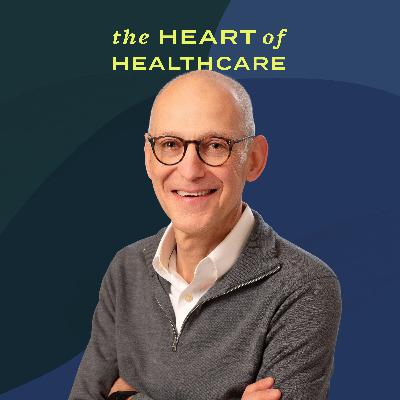
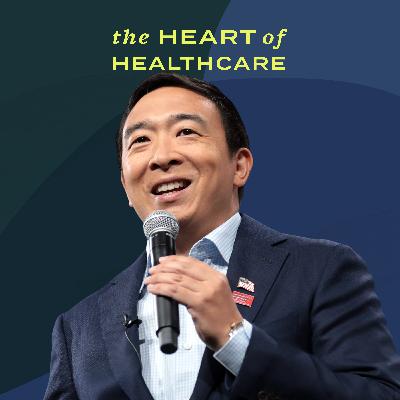
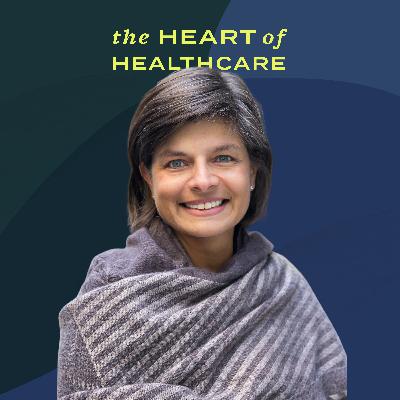
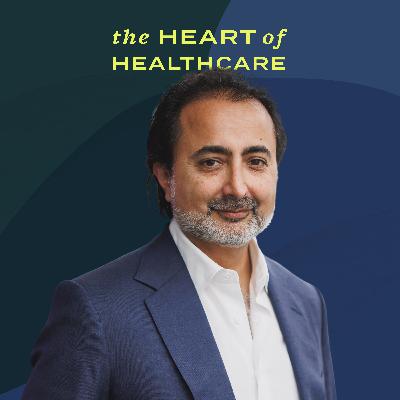
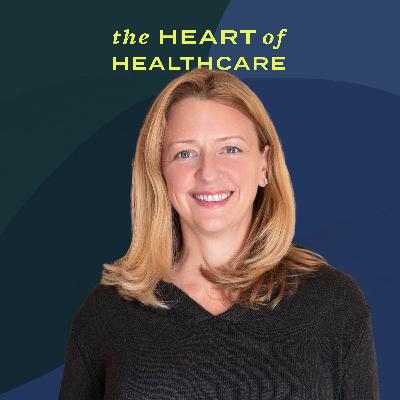
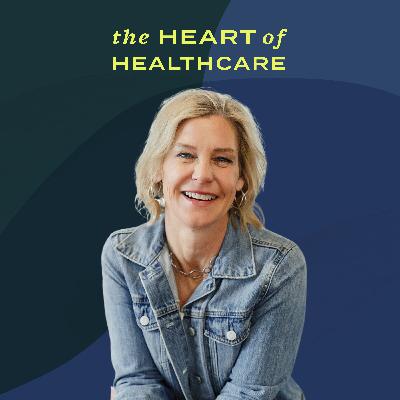
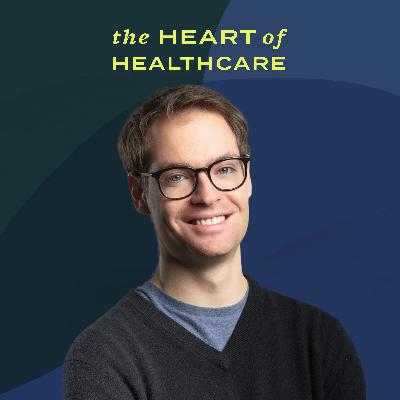
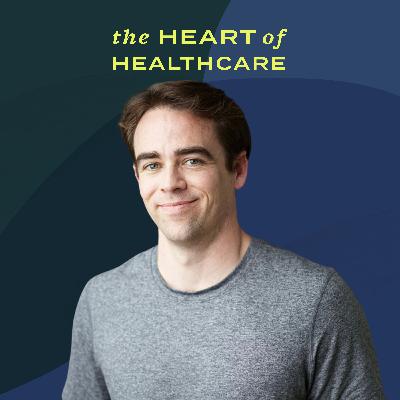

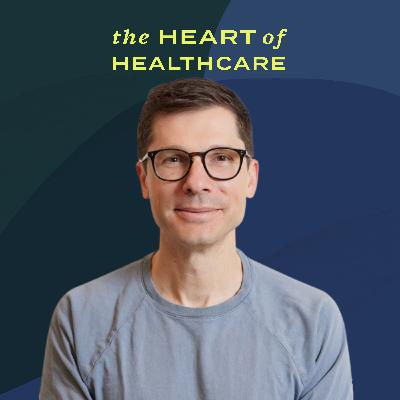




It's definitely an excellent episode of your awesome podcast. thank you for sharing it. I'd like to know how can I find the script? I mean if this could be possible for non native speakers, it would be great! anyway, keep up the good work 💪🧠